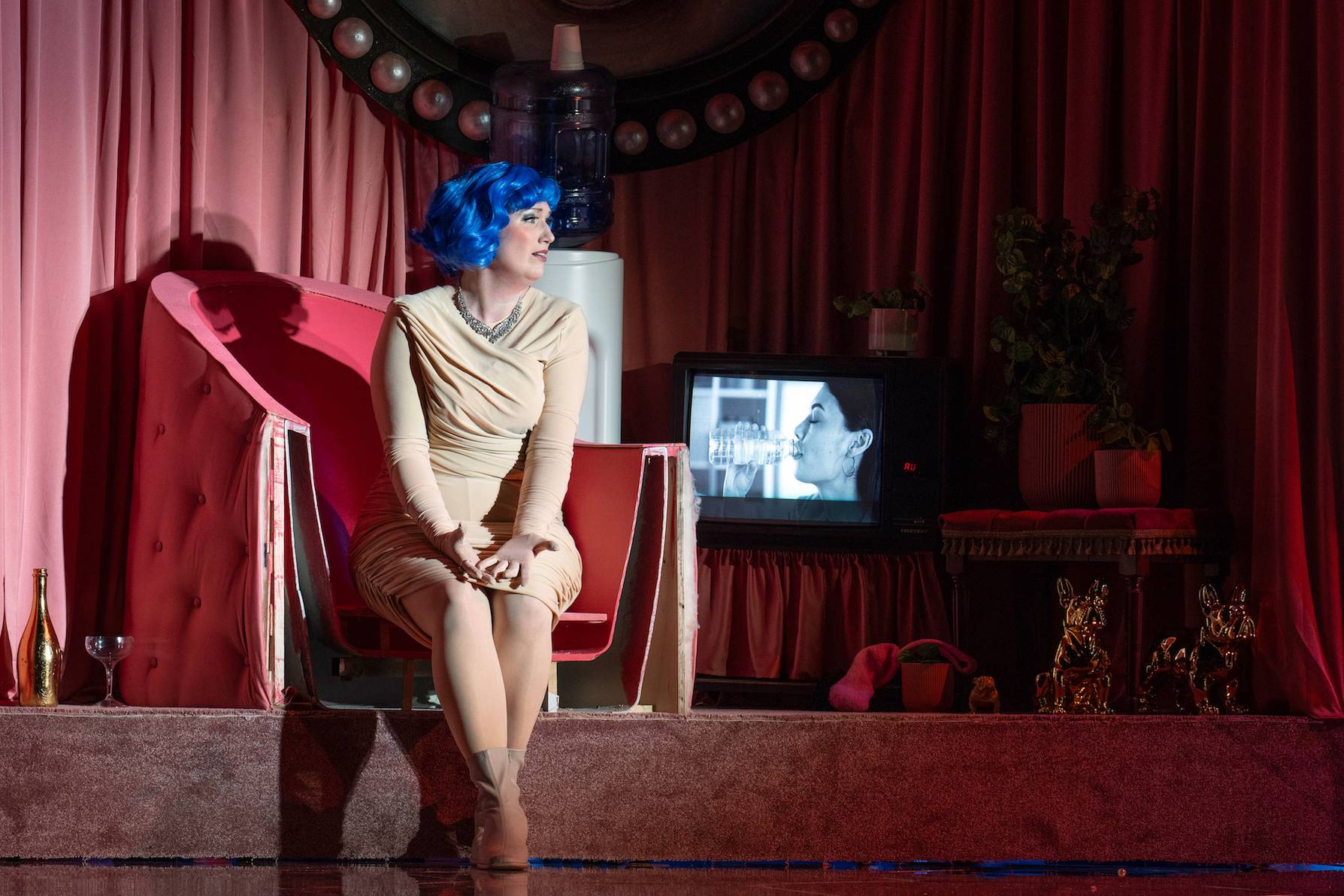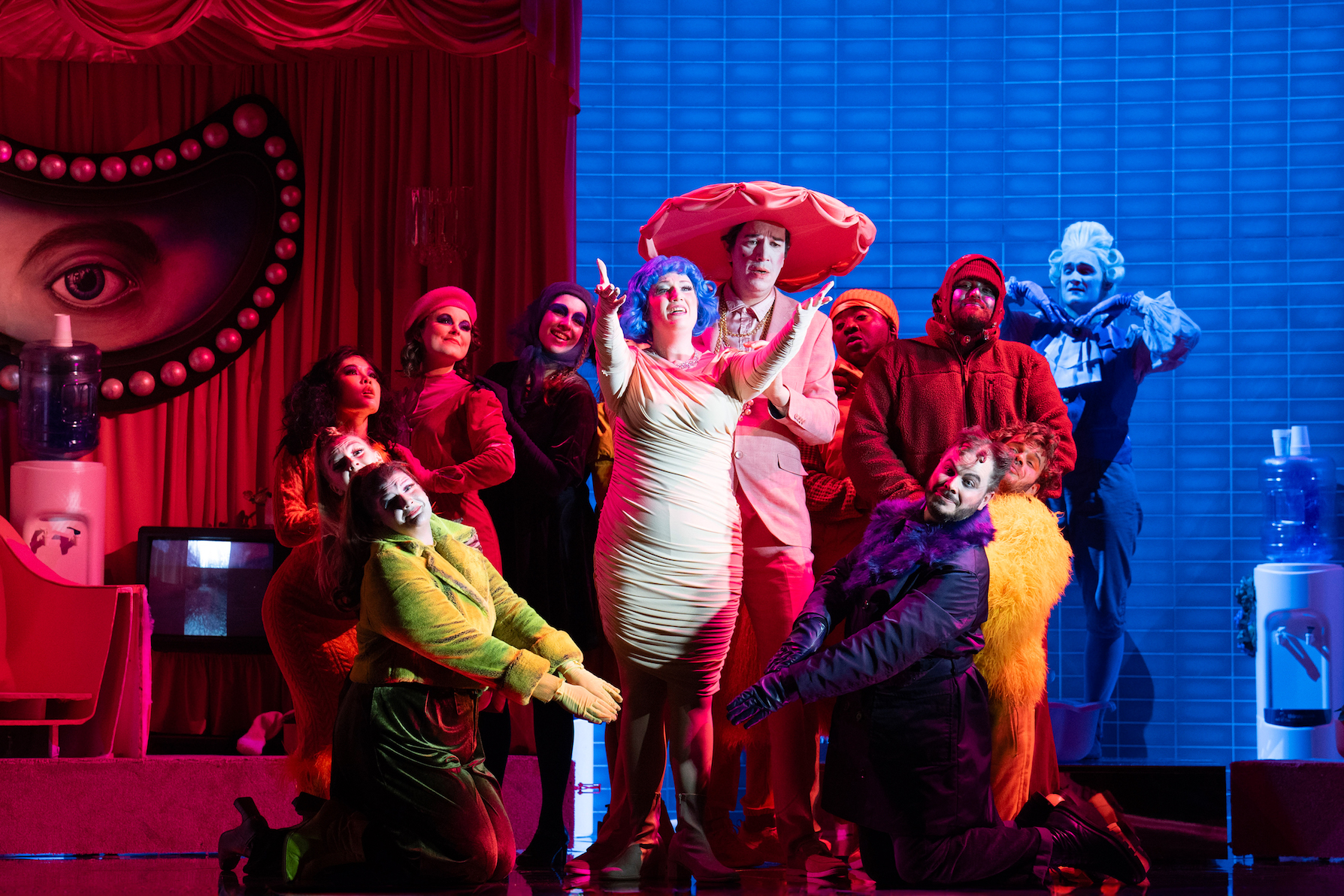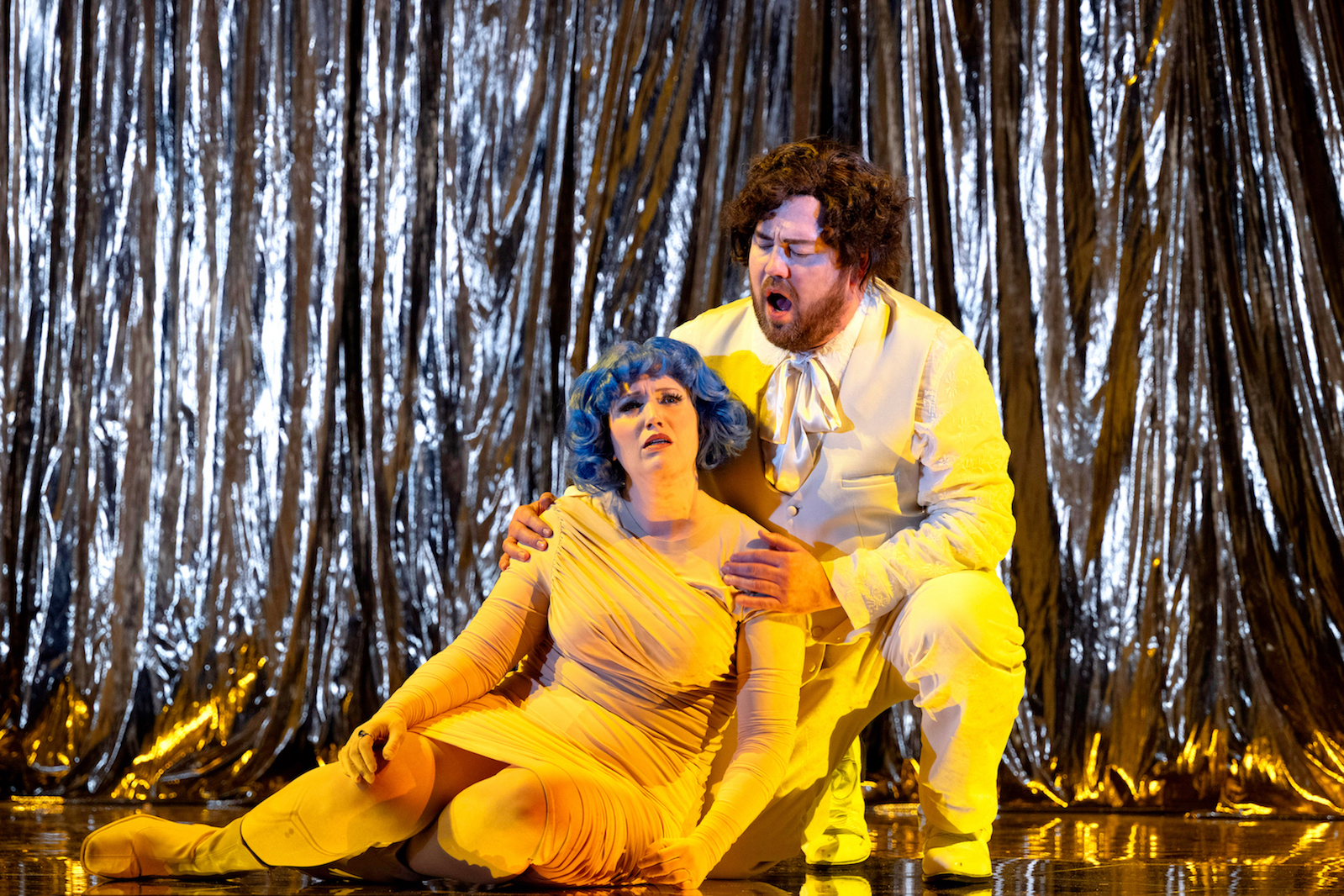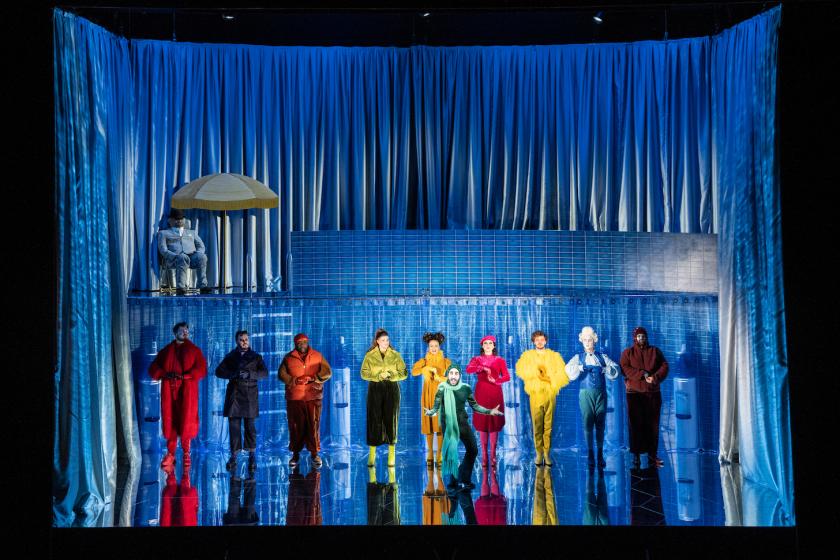Opera in Britain is currently cursed by funders, politicians and ideologues – of right and left – who heartily detest the form. Alas, some directors do their work for them with interpretations seemingly designed to undermine the very art they are employed to serve. English Touring Opera (rare beneficiaries of a recent boost to their public subsidy) have regularly excelled in the past. They will do so again.
Indeed, their new version of Puccini’s first mature success, Manon Lescaut, began its cross-country progress at Hackney Empire on Saturday with plenty of striking vocal moments – notably from Jenny Stafford in the title role and Gareth Dafydd Morris as her suitor Des Grieux – along with some zestful, punchy playing from the pit orchestra conducted by Gerry Cornelius.
However, it has be said that Jude Christian’s production seriously misfires. Often crass and crude, strewn with farcical, pointless bits of business and dressed in a repulsive palette of retina-blasting ugliness, it almost seems intended to make us hate not the heroine’s misogynistic persecutors but the work itself and its composer. Premiered in 1893, but based on Abbé Prévost’s 1731 novel, the opera certainly shows the doomed, pliable Manon – first destined for the convent but then the plaything of the creepy “protector” Geronte and love-object of the adoring but conceited Des Grieux – as victim of a trade in women’s lives and souls that romantic idealists may pursue as much as pimps, priests or patriarchs. “Feminist” Manons have become standard procedure of late. Previous directors have shared Christian’s urge to bring the “ritual sacrifice” of a “misbehaving woman” centre-stage as the heroine, deported for immorality, dies in a parched colonial desert (improbably located by Prévost in “Louisiana”). The trouble here comes not from the ends, but the means. Laboured movements, gimmick-crammed sets, grotesque costumes and a cloth-eared English libretto (by the director): all detract from the principals’ noble efforts to give strength and even grandeur to Manon’s wavering, outgunned protest against the varieties of confinement imposed on her by family, law, taboo and even an “ideal” love.
The trouble here comes not from the ends, but the means. Laboured movements, gimmick-crammed sets, grotesque costumes and a cloth-eared English libretto (by the director): all detract from the principals’ noble efforts to give strength and even grandeur to Manon’s wavering, outgunned protest against the varieties of confinement imposed on her by family, law, taboo and even an “ideal” love.
Christian’s misbegotten conception of the opera’s first half as a “surreal nightmare” delivers a sort of cross between Hockney-era poolside California and the kind of panto the Hackney Empire itself might have mounted a century ago. This garish alienation does not focus but fatally blurs Manon’s thwarted bid to break her visible and invisible chains. From golden dogs to water coolers, odd props are laden with a portentous symbolic freight that generates clutter without much illumination. And how does Manon’s blue fright wig and hospital-bandage outfit (Jenny Stafford, pictured above) enhance her dignity? The psychedelic vulgarity turns into another oppressive force that drains the heroine, and her drama, of humanity. “Make it stop. It’s like a nightmare,” someone sings. Not quite: but I have seldom seen a more ostentatiously brash set of stage tricks. Good singers deserve much better.
Christian’s cartoonish aesthetics (more than once I thought of The Simpsons rather than classic Commedia dell’Arte) load a heavy handicap onto the vocalists every time they struggle to make character and feeling sound as credible as Puccini’s supple, agile score demands. One example of intrusive incoherence: why turn the lecherous dotard Geronte, who ensnares Manon in a bling-filled boudoir, into a camp caricature in shocking pink and a comedy hat? (Edward Hawkins, pictured below with Jenny Stafford.) He needs to make our, and her, flesh creep, not mince and strut like some rouged refugee from a 1970s sitcom. Throughout, though with some respite in a more sober second half, these wilfully bizarre visuals cut across both music and drama. All credit, then, to the singers for wrenching so much poise and power from the thrift-shop catastrophe of this production’s look. Beset all round by kitsch, and by some lumpy choreography, both Stafford and Morris sounded pinched and thin at first. Notably, when the direction left them alone they began to bloom. By the time of the great second-act duet, as Stafford’s robust but never harsh soprano cut through swelling orchestration, we could hear not just the ardour but the doubt and inner conflict that each of this pair brings to their passion. Light, even fragile, at first, Morris grew in authority, lucidity and warmth.
Throughout, though with some respite in a more sober second half, these wilfully bizarre visuals cut across both music and drama. All credit, then, to the singers for wrenching so much poise and power from the thrift-shop catastrophe of this production’s look. Beset all round by kitsch, and by some lumpy choreography, both Stafford and Morris sounded pinched and thin at first. Notably, when the direction left them alone they began to bloom. By the time of the great second-act duet, as Stafford’s robust but never harsh soprano cut through swelling orchestration, we could hear not just the ardour but the doubt and inner conflict that each of this pair brings to their passion. Light, even fragile, at first, Morris grew in authority, lucidity and warmth.
As Manon’s devious brother Lescaut, more procurer than guardian, Aidan Edwards had swagger and assurance to burn. Edward Hawkins’s Geronte managed on occasions to sing his way bravely out of a trivial, demeaning concept for his role. As lead singer in the “madrigal” that Geronte composes for his human pet, mezzo Cicely Hé hinted at a voice to relish – though here, as often, the puerile animal-themed party hats of the serenaders meant that our eyes got in the way of our ears. Even the stirring, tender and well-played intermezzo that precedes act three (kudos to Cornelius) suffered from fussy onstage business to dilute its force. And those cheapskate carnival costumes made the dismaying dockside parade of so-called “minxes and sluts” prior to their expulsion less harrowing than it should have been. The chorus, however, rose well to the scene’s cruel fatality. In the couple’s final desert anguish (pictured above), we might have hoped that the blazing gold surrounds – an ironic reprise of the trashy glitz that seduced Manon – would be simple enough to let the singers do the work. But no: a ludicrous giant dog’s head looms distractingly over the action. Still, both the final duet and the outcast Manon’s searing soliloquy of farewell (to love’s delusions, and to life itself) left us with a proper respect for Stafford’s and Morris’s whole-hearted immersion in these roles. They gripped and moved, in spite of everything. Singing of such commitment proves that opera can survive not just its detractors, but its directors too.
In the couple’s final desert anguish (pictured above), we might have hoped that the blazing gold surrounds – an ironic reprise of the trashy glitz that seduced Manon – would be simple enough to let the singers do the work. But no: a ludicrous giant dog’s head looms distractingly over the action. Still, both the final duet and the outcast Manon’s searing soliloquy of farewell (to love’s delusions, and to life itself) left us with a proper respect for Stafford’s and Morris’s whole-hearted immersion in these roles. They gripped and moved, in spite of everything. Singing of such commitment proves that opera can survive not just its detractors, but its directors too.















Add comment